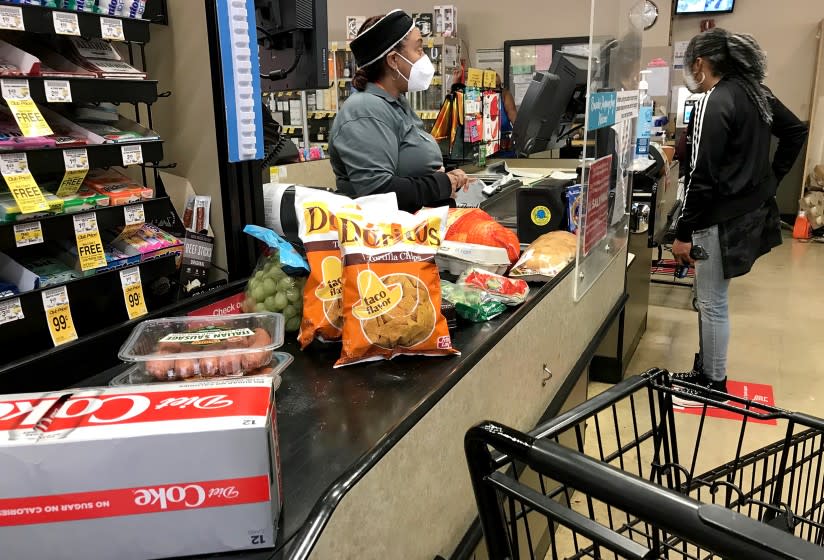Editorial: L.A. and Long Beach want 'hero pay' for some workers but not others

Elected officials in Los Angeles, Long Beach and other California communities have declared that they want to honor essential workers by requiring employers to provide up to $5 an hour in supplemental “hero pay” for the next several months. But not all essential workers are heroes in eyes of local lawmakers, apparently, as the proposals would exclude the vast majority of front-line employees.
The notion is catching on. The Santa Monica City Council voted last week to require "hero pay," and Long Beach leaders are expected to vote on a similar proposal this week. The Los Angeles County Board of Supervisors is expected to finalize its version this month. A number of other jurisdictions, including the cities of Los Angeles and Santa Ana, have raised the idea, too.
The proposals vary slightly, but they generally would require large supermarkets and drugstores to provide $4 to $5 an hour extra in hazard pay for on-site employees. The bonus payments would continue for 120 days or until the jurisdiction’s health risk is considered minimal.
Why does it make sense for the government to single out one sector for special treatment? In fact, it’s not even a uniform mandate on grocery and drugstore workers. The various proposals would affect only publicly traded chain stores or those with more than 300 employees.
There’s no question that grocery and drugstore employees face on-the-job risks of contracting COVID-19. In fact, as infections become more prevalent, any worker who has to show up for work in person faces greater risk. That is especially true for employees who work long hours indoors around lots of people, some of whom do not wear masks or maintain a safe distance.
Last week, Los Angeles County was investigating 538 workplace coronavirus outbreaks — the highest number ever — with multiple infections reported at warehouses, corporate offices, manufacturing plants, distribution centers, police and fire stations, courthouses, retail outlets, car dealerships, restaurants and grocery stores.
Yet the “hero pay" proposals would benefit a relatively small group of workers. The proposed laws would give employees behind the grocery store meat counter a $5-an-hour boost, but not the men and women working in meatpacking plants, which have had some of the worst outbreaks.
Supermarket deli employees would get hazard pay but not Subway employees. Workers at Amazon-owned Whole Foods would qualify but not the employees at Amazon warehouses, where inspectors have found pandemic safety violations.
The political rationale behind the “hero pay” proposals is that the pandemic has boosted major retailers’ profits, so they should be required to share the largesse with workers. And their revenues have gone up. But lawmakers want Target and Walmart, which sell groceries, to provide hazard pay, but say nothing about Home Depot, Lowe's and other “essential” big-box stores that do not sell food but have stayed open through the pandemic and have benefited from a surge in home improvement projects from homebound people.
And what about the cities and counties themselves? The city of Los Angeles, L.A. County and Long Beach have not offered pandemic hazard pay to their own front-line employees despite outbreaks at government offices and facilities.
Ideally, employers would increase pay voluntarily. In his COVID relief plan released last week, President-elect Joe Biden said he will call on chief executives and other business leaders to step up and provide hazard pay to front-line essential workers. Most major retailers did so during the first few months of the pandemic. But many companies phased out the extra hourly compensation when coronavirus cases declined. Some continued to offer occasional bonuses or other perks. Still, when cases — and employee risk— increased in the fall, employers should have boosted pay again.
Yet the proposals from local elected officials don’t work either. Government shouldn’t be picking winners and losers, or who deserves “hero pay” and who doesn’t. The hazard pay proposals are not fair to all essential workers, and they may not be legal.
Nor has there been any meaningful attempt to consider the impacts of requiring employers to boost pay by as much as 30%. Will grocery stores pass the cost on to shoppers? Will they lay off workers? Will these types of mandatory pay hikes accelerate a more disturbing trend of companies replacing employees with independent contractors? Albertsons recently announced it would stop employing delivery workers and replace them with gig workers. That trend may pick up steam now that voters, disappointingly, have approved Proposition 22, which allowed app-based transportation services such as Uber to avoid treating drivers as employees.
So what can elected officials do to help front-line workers? They can require safe working conditions. They can demand that local and state regulators step up workplace inspections. They can enforce capacity limits in stores and mask-wearing mandates for customers. They can require that companies provide frequent testing and notify employees when a fellow worker tests positive. And they can make sure that workers are able to take advantage of the sick leave and family leave to which they are legally entitled.
This story originally appeared in Los Angeles Times.

